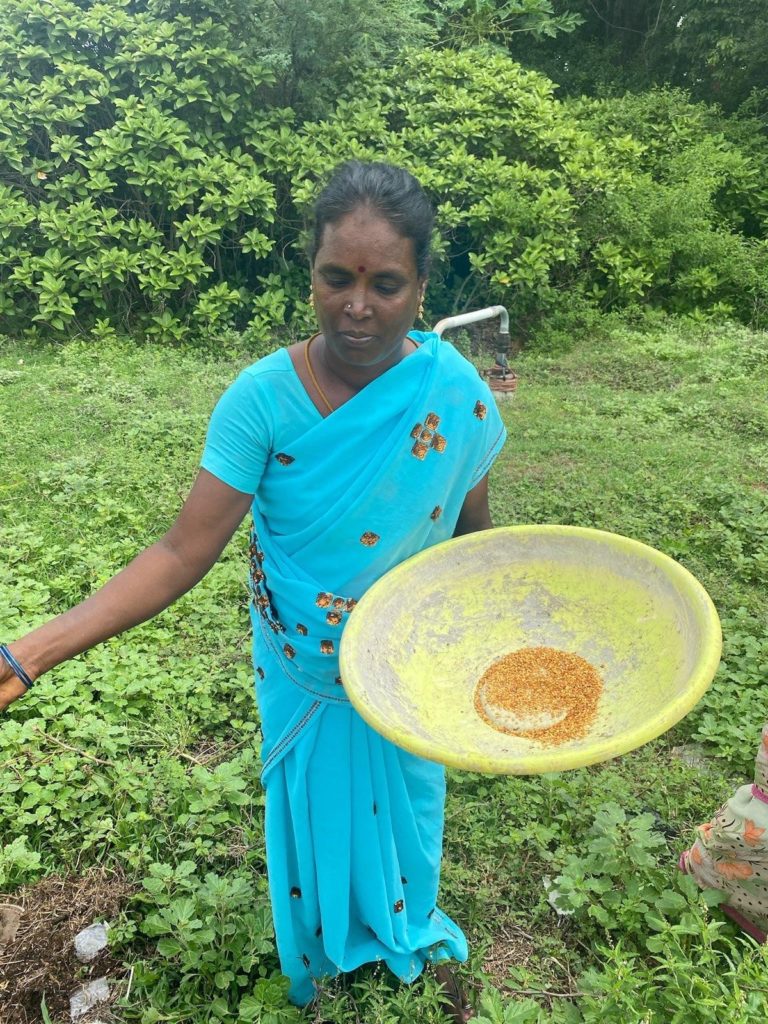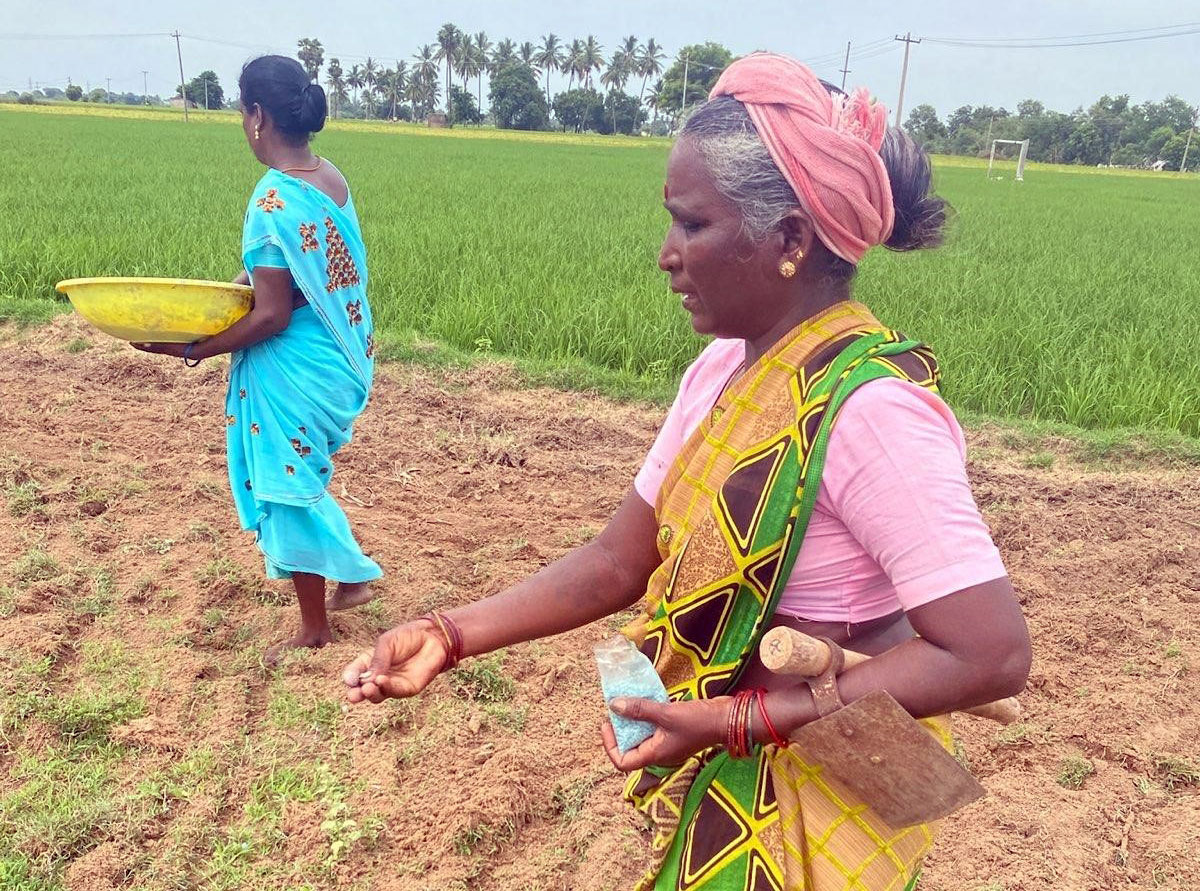“It is the best feeling to know that you are tilling your own land and growing your own food” – Shakila Kalaiselvan, a Dalit woman leading her community’s struggle for land and rights
TAMIL NADU, India – Shakila Kalaiselvan, founder and leader of the Pallur Dalit Women’s Collective, had a rough childhood. Born in a Dalit family, Shakila’s parents were landless agricultural labourers. Her father eventually left them for another woman, leaving her mother to raise two daughters single-handedly. Shakila saw her mother struggle to support them with very measly labour wages. “She worked daily in the fields, but when it was time for harvest, we still had nothing to eat.”
At 16, Shakila married a Sri Lankan repatriate who was rejected by her community. Between her husband’s earnings doing odd jobs and her wages from agricultural labour, they could barely make ends meet for their three children, two boys and one girl.
This prompted Shakila to approach Society for Rural Education and Development (SRED). Founded in 1979, SRED is a network of four state-level women’s movements and 14 mostly women-led village-level movements from 350 villages in three districts in Tamil Nadu, India.
“Without women like her, we cannot do what we do,” said SRED Executive Director Fatima Burnad of Shakila. Burnad is also a member of PAN Asia Pacific’s (PANAP) Steering Council.
Caste system and landlessness
The prevailing caste system in India continues to oppress Dalits and indigenous women. They are regarded as the lowest rung of the caste hierarchy based on ritual purity and occupation. In Tamil Nadu and other Indian states, more than 60% of Dalit households are landless.
As land cultivators, Dalit women cannot access benefits from the state. They are not recognised as farmers or agricultural workers and are regarded as very low status in society. Discriminatory practices deny them their basic rights, even though the Hindu Succession Act and the Land Reform Act recognise their right to share in family properties. Because of this, they are the most disadvantaged and worst affected groups in their communities and society.
The Pallur Dalit Women Collective was formed in 2016 when Shakila sought the help of SRED’s Dalit Women’s Movement to claim 7.5 acres (three hectares) of illegally-occupied common land (wastelands) in two places in their community. After a series of training meetings on Dalit Rights and Land Rights, Shakila organised and mobilised 40 Dalit women to assert their entitlements at the District Administration for Land Titles.
Now, with the women’s collective farm, Shakila attests, “This is the first time in my life that I get to bring home whatever I harvest. Before, I couldn’t do that with my labour wages; it is the best feeling to know that you are tilling your own land and growing your own food.”
Women in unity and action
However, the Pallur Dalit women’s victory was not without serious hurdles.
At first, the District Administrator completely ignored them; even the Village Administrative Officer refused to give them the requested land maps. They also approached the Taluk office, where they were told that it is only “natural” for landowners to encroach on common land.
Seeing no positive and helpful response from the government, the women decided to assert their rights and take matters into their own hands. They hired a JCB truck to clear the land, but when the driver found out it was common land, he backed out. Still, the women did not falter. They persisted in toiling and eventually cleaned the rocky and thorny ground themselves.
SRED supported them by providing a solar water pump to irrigate both lands. They were also offered agricultural instruments and seeds that helped them preserve their own seed bank. The women’s perseverance and collective action made the lands fertile and rain-fed. They dug up a pannai kuttai (farm water-saving pond) to collect rainwater and built tanks to store water.
All these efforts were met with obstacles from the government and local bureaucrats. The Revenue Officers first summoned them because of a petition by caste landlords alleging that the sand quarry they made would be used illegally. The women protested before the Revenue Officer and successfully refuted the allegations. They demanded their land titles, but the Revenue Officer told them that, while they could continue cultivating the lands, no titles would be given to them because the government supposedly intended the lands for cattle grazing. In the end, the women succeeded in asserting their rights. They now have claimed the lands they have fruitfully utilised for collective farming.
The Pallur Dalit women faced their biggest challenge when a landlord interested in buying their land attempted to kill Shakila. The women exposed and fought this sinister attempt by supporting each other and asking for the help of SRED and their supporters. Once again, the women’s strength in their unity and collective action enabled them to fight and overcome this grave threat against one of their sisters.
Inspiration
As Dalit women who historically were not allowed to own lands, be independent in decision-making, and were consistently discriminated against due to caste and gender, Shakila and the Pallur Dalit Women Collective inspire all Dalit women. Because of their success, Shakila mobilised 40 more women to occupy another 2.5 acres (one hectare) of land in Pallur. The collective had also identified some 18 acres (7.3 hectares) more to claim and has started a seed bank preparing for organic farming.

Through the years and presently, as a collective, the women have been cultivating and harvesting lentil, corn, green gram, red gram and millet. SRED assisted them with various training programs on natural farming methods, including preparing vermicompost, natural manure and pesticides. Shakila and other collective members have also started driving the tractor.
The collective members equally share the produce after harvest. They have built their water tanks and rainwater-collecting ponds from scratch. They put up their pipelines for irrigation. They have set up their own office where they keep their agricultural instruments and seeds for collective farming.
Shakila has also attended meetings and conferences at local, national and regional events to share their successful and inspiring story. She participated at the Regional Comprehensive Economic Partners (RCEP) meeting in Hyderabad, the All India Kissan Movement in New Delhi, the Delhi National Conference of Women organised by Makaam, and the National Dalit Conference in Pune to represent landless Dalit women, promote organic farming and condemn corporate land-grabbing. “Agricultural land should not be given to foreign investors. Farming in this country depends on small tenants and landless labourers, and the majority of labour comes from women.”
Fighting oppression
SRED’s Burnad firmly believes that issues of caste and gender, especially among Dalit women in rural India, are deeply rooted in societal class struggle. It is not a coincidence that most landless women come from lower castes. As Dalit women, they do not have equal opportunities to land, employment or even the most basic of services. Poverty and discrimination against Dalit women are the main reasons that motivate them to organise and mobilise themselves into movements and collectives to fight for their land rights.
Burnad says, “The integration of the Dalit women’s movement and the landless labourers’ struggles will become a broad people’s movement to fight against oppression in society. We must continue to educate, train and organise Dalit women to fight against their own oppressions and the oppressions of others to achieve a new and just society where everyone, irrespective of sex, class or caste, is equal. Such programs help Dalit women go out of their villages to meet other women and listen to their problems. Neither women’s problems nor social problems can be solved as long as women remain isolated in their homes.”
Indeed, the non-recognition of Dalit women’s land rights is the major block in realising the full potential of women to improve rural livelihoods. The social structures of caste and gender and their correlations with economic structures prevent Dalit women from mobilising themselves to claim their land rights. At the policy level, India’s land governance system and “land reforms” have further strengthened patriarchal norms of society at village, state and national levels.
The recognition of women as farmers and their rightful representation in government and relevant institutions would bring them into the public process of land distribution and ownership and access to resources, not only for their empowerment but also for the common good of their communities. ###
PANAP featured a version of this article in Women in Agroecology: Towards Pesticide-Free Communities, a series of stories on rural women survivors of pesticide poisoning and/or transitioning to agroecology.
#NoLandNoLife Features discuss recent developments, events, and trends on land and resource grabbing and related human rights issues in the region as well as the factors and forces that drive it. Send us your feedback at nolandnolife@panap.net.








Discussion about this post